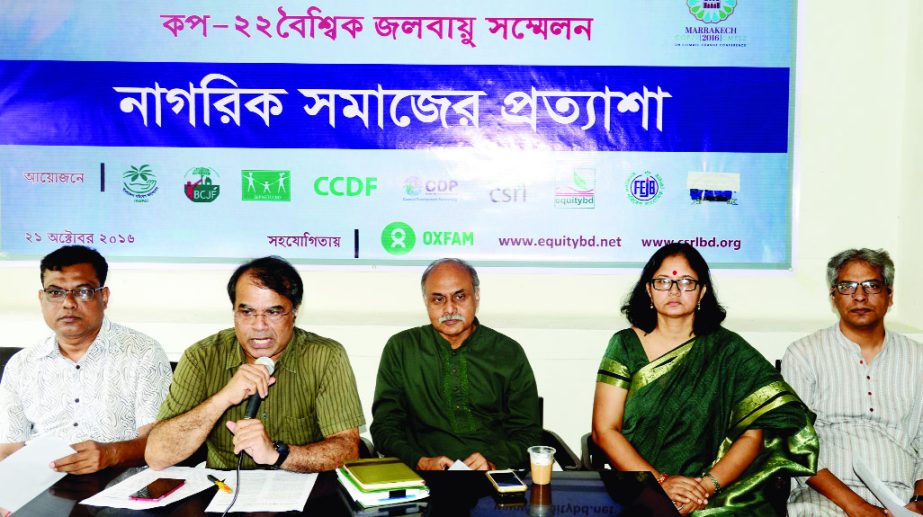
City Desk :
Climate experts on Friday called for strengthening bargaining capacity of Least Developed Countries (LDCs) like Bangladesh through acquiring knowledge on different aspects of climate change issue to avert its possible harmful impacts.
LDCs must be united by developing strong leadership to pile up pressure on industrialized nations to take action to stem the planet’s rising temperatures, they told a press conference on “COP 22 Climate Change Conference: Expectation of civil society” at the Jatiya Press Club in the city.
Different organizations including Forum of Environmental Journalists of Bangladesh (FEJB), Equity Justice Working Group-Bangladesh (EquityBD) and Centre for Sustainable Rural Livelihood(CSRL) organized the press conference.
General Secretary of Jatiya Press Club and Chairman of FEJB Quamrul Islam Chowdhury, Chief Moderator of EquityBD M Rezaul Karim Chowdhry and CSRL Secretary Sharmind Neelormi, among others, addressed the press conference.
Bangladesh alone cannot face climate change issue as it is a global phenomenon, Quamrul Islam said, adding it should move bilaterally as well as multilaterally along with strong bargaining capacity to pile up pressure on rich nations to extend their financial and technical supports to climate vulnerable countries.
Despite having little contribution to global carbon emission, Bangladesh is one of the most vulnerable countries due to adverse impact of global climate change and responsible countries must provide financial and technical supports to LDCs aiming at tackling its negative impacts, he added.
Sharmind Neelormi said LDCs like Bangladesh are bearing burden of excessive carbon emissions caused by industrialized nations, which are mainly responsible for global warming, a great challenge for the planet.
Bangladesh is already facing adverse impact of global climate change and it is urgent to raise it voice to get adequate financing supports from green climate fund to make it climate resilient country, she added.
Rezaul Karim said, “Many people across the country have become refugees due to various reasons including flood, river bank erosions and cyclone. Basically they are climate change victims.”
The Paris accord requires all countries to devise plans to achieve the goal of keeping the rise in temperatures within two degrees Celsius above pre-industrial levels and strive for 1.5 C if possible.
A total of 62 countries accounting for almost 52 percent of emissions have now ratified the agreement to commit to take action to stem the planet’s rising temperatures.
Climate experts on Friday called for strengthening bargaining capacity of Least Developed Countries (LDCs) like Bangladesh through acquiring knowledge on different aspects of climate change issue to avert its possible harmful impacts.
LDCs must be united by developing strong leadership to pile up pressure on industrialized nations to take action to stem the planet’s rising temperatures, they told a press conference on “COP 22 Climate Change Conference: Expectation of civil society” at the Jatiya Press Club in the city.
Different organizations including Forum of Environmental Journalists of Bangladesh (FEJB), Equity Justice Working Group-Bangladesh (EquityBD) and Centre for Sustainable Rural Livelihood(CSRL) organized the press conference.
General Secretary of Jatiya Press Club and Chairman of FEJB Quamrul Islam Chowdhury, Chief Moderator of EquityBD M Rezaul Karim Chowdhry and CSRL Secretary Sharmind Neelormi, among others, addressed the press conference.
Bangladesh alone cannot face climate change issue as it is a global phenomenon, Quamrul Islam said, adding it should move bilaterally as well as multilaterally along with strong bargaining capacity to pile up pressure on rich nations to extend their financial and technical supports to climate vulnerable countries.
Despite having little contribution to global carbon emission, Bangladesh is one of the most vulnerable countries due to adverse impact of global climate change and responsible countries must provide financial and technical supports to LDCs aiming at tackling its negative impacts, he added.
Sharmind Neelormi said LDCs like Bangladesh are bearing burden of excessive carbon emissions caused by industrialized nations, which are mainly responsible for global warming, a great challenge for the planet.
Bangladesh is already facing adverse impact of global climate change and it is urgent to raise it voice to get adequate financing supports from green climate fund to make it climate resilient country, she added.
Rezaul Karim said, “Many people across the country have become refugees due to various reasons including flood, river bank erosions and cyclone. Basically they are climate change victims.”
The Paris accord requires all countries to devise plans to achieve the goal of keeping the rise in temperatures within two degrees Celsius above pre-industrial levels and strive for 1.5 C if possible.
A total of 62 countries accounting for almost 52 percent of emissions have now ratified the agreement to commit to take action to stem the planet’s rising temperatures.

